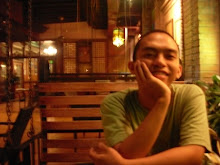 (second of the four-part series)
(second of the four-part series)First principle
Judging is a default programming in our minds. It is something automatic, something we are unaware of. I remember a friend who often sees his world full of judgment. He has always something ugly and disagreeable to say about almost all people, situations and things that come in his way. Whenever he comes across with a person he hates, he would echo what the young psychic boy says in the movie Sixth Sense: "I see dead people." I would laugh on his sort of acidic humor and always tell him not to be too hard on people. He would simply quip and tell me he doesn't really care at all. I deeply understand how he finds his world in this way. He grew up in a family where the word unpleasant is palpable everyday. And he would tell me not to wonder, for his world has made him the person he is.
He reminds me of this default that I even hardly reprogram. Years ago I had judged a lot of things, such as how people see me, or how I see others, or those lousy TV programs and celebrities, or nonstop political commotions, or our lives becoming more stale and boring. I judged every thing down to the littlest detail, like that of the appearance of others, or the way they think in contrast with the way I think. I was a self-righteous man who often see myself thinking the proper way, working more excellent than others. When I found people much better than me, then I started to judge myself as worthless and deprived as I compared myself to them. Practicing Detachment has given me a clear perspective to see how judging works.
There are in fact 2 distinct ways of judging. The first one is to conclude. If we assume that any person, thing, or situation would happen or appear the way it happened in the past, this is abrupt conclusion. We conclude because we thought that our "bad" experiences might repeat again. Conclusions are rampant in our society everyday, and they go with different terms such as stereotyping and stigma. We conclude that things will go bad because of the dwindling economy or our lives would go wrong if we don't do something else. Our decisions are largely driven by our fears, and we often end up more regretful than what we were before. The second way is to compare. This is the other wing that makes judgment soar high in our senses. We often compare ourselves base on what we see in the society. We feel better when we find someone much worse than us. We feel worse when we find much better than us. This comparison encompasses different aspects, all of them are external factors, such as career, clothing, possessions, money and power.
It's about time to cut off these wings of judgments. This is never an overnight job. Nonetheless, with everyday awareness, we can see ourselves in the point of unconscious judging. The practice of this art calls for our vigilance and discipline. It does not really matter if you judge someone because they look unfashionable, as to compare judging someone being corrupt. Both are judgments, as long as you generate disgust, hatred and fault-finding attitude. It takes a small shift of consciousness, like that of crossing a railroad. When you find yourself judging, stop. Look at the person or situation you are judging. Listen to the voice of your compassion within: "I see a Loving person within him/her waiting to be awakened." "I see a Loving purpose in this situation/thing." Whenever you feel the urge to judge, challenge your thoughts. Then see the opportunity to intend blessings, in many ways you can; prayers, intentions, affirmations, and acceptance will suffice.
Often we have overlooked the power of judging ourselves, when in fact this is the most dangerous. Our ways of judging others are sheer reflections of how we judge ourselves. So the moment you dislike a person, whatever circumstances it takes, begin to reflect on your judgments. What is it you see in others that you can also see (but refuse to see) in yourself? This is a daunting task, but trust that you are bound to succeed. What you see outside is what is unheeded inside. No one causes you harm and problems but yourself. When you start become aware of this, you have reached the first step to Detachment.

Judging ourselves and others have resulted from our thoughts deeply ingrained in our unawareness. They manifest in the process of our automatic reactions towards outside circumstances, it ricochets back to us with disturbing emotions. Without mindful Nonjudging, we will perpetuate these repetitive forces that bring us inner hell. The basic medium of the art of Detachment is the constant awareness of Nonjudging. We begin to detach when we do not judge. This teaches us to do unbiased observation and alertness of our situations and the people involved, particularly the subject of our reactions. We eventually learn to see clearly, without bigotry and narrowmindedness. We can easily accept our own shortcomings and failures as we pursue our inner goodness that we can always be. We can share this by doing the same for others, with full understanding and empathy. In the light of Mother Teresa's words, when we stop judging, we can now spend more time for our most important task: Loving.
(to be continued)










0 comments:
Post a Comment